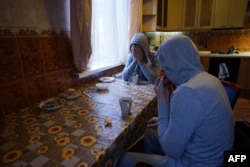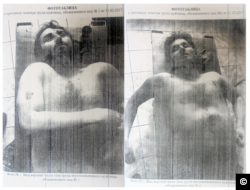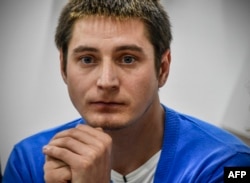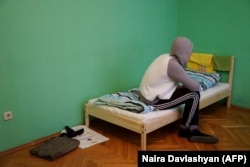On Monday, January 14, the Russian LGBTI Network reported that 40 men and women suspected of being homosexual have been detained in the Chechen Republic since late December, two of whom have died in custody.
The network’s program director, Igor Kochetkov, said it was impossible to know the exact number of victims.
“The local police are doing everything they can to ensure that they cannot leave the [Chechen] Republic or subsequently seek protection in court,” he said. “Their documents are taken away from them, they are threatened with falsification of criminal cases against them or their relatives and they are forced to sign blank forms.”
According to the Associated Press, Kochetkov said the latest wave of alleged anti-gay persecution started with the detention of a social media group administrator popular with LGBTI people in the North Caucasus. Contacts taken from that administrator’s phone formed the basis for the mass detentions that followed, said Kochetkov.
“Persecution of men and women suspected of being gay never stopped. It’s only that its scale has been changing,” he said.
Another LGBTI social media group operating in the region released a statement asking members to “leave the republic as soon as possible.”
Alvi Karimov, Press Secretary for Chechen leader Ramzan Kadyrov, told Interfax news agency on Monday, January 14, that there had not and could not have been detentions on the basis of sexual orientation in Chechnya during that time frame.
The truth remains unclear, largely due to a lack of transparency in Chechnya. Reporters Without Borders (RSF) last year included Kadyrov on its list of "Predators of Press Freedom,” noting Chechnya has no opposition media.
"The very few journalists who still dare to defy the official consensus and obligatory pro-government enthusiasm are warned or threatened, and pressure is put on relatives," RSF said.
Kadyrov himself famously told HBO "Real Sports” correspondent David Scott "we don't have any gays” in Chechnya.
"If there are any, take them to Canada. Praise be to God. Take them far from us so we don't have them at home. To purify our blood," Kadyrov said.
Chechen Persecution of Gay Men
Persecution of homosexual men in Chechnya has been reported and verified in the past by news organizations and human rights advocates.
Amnesty International, citing the independent Russian newspaper Novaya Gazeta reported in early April 2017 that more than 100 men suspected of being gay had been abducted in Chechnya as part of a “coordinated campaign.”
Those men were reportedly subjected to torture and ill-treatment, and also forced to disclose the identity of other LGBTI individuals.
“Novaya Gazeta claimed to have verified information about at least three men who had been killed by their captors, but its sources claim that there have been many more killings,” Amnesty wrote.
Apart from mass detentions, Novaya Gazeta also found evidence of torture and murder of people of different sexual orientations in Chechnya
In December 2018, the newspaper obtained documents from Russia's Investigative Committee showing that two men, Shoto-Shamil Akayev and Ayub Ibragimov, had been killed with shots to the back of the head at a police station where advocates say homoseuxals were detained.
That probe by Novaya Gazeta was prompted by a complaint filed by Maksim Lapunov, who claimed he was detained in Chechnya for 12 days in October 2017 because of his sexual orientation. Lapunov said he was held with Akayev and Ibragimov at the same Grozny police facility. After being released, Lapunov met with Akayev’s parents before fleeing Chechnya.
Lapunov was the first person to go public with allegations that members of Chechnya’s LGBTI community were being detained and tortured.
Chechen police claimed Akayev and Ibragimov were killed during an attempted attack on a police station.
Russian authorities failed to open a criminal investigation based on Lapunov's complaint, saying they could not corroborate his account.
In July 2018, an official from the Russian Prosecutor-General’s Office, Valery Maksimenko, told a UN committee in Geneva that investigators found no evidence supporting Lapunov’s accusations.
In May 2018, Russian Justice Minister Aleksandr Konovalov, speaking to the UN Human Rights Council in Geneva, said officials couldn’t find any gay people in Chechnya, Radio Free Europe/Radio Liberty (RFE/RL) reported.
Last October, Tanya Lokshina, associate director of the Europe and Central Asia division of Human Rights Watch, told RFE/RL that Lapunov’s case had stalled due to a “lack of political will."
But in November, the Organization for Security and Cooperation in Europe (OSCE) invoked paragraph 12 of the 1991 Moscow Document of the Conference on the Human Dimension of the OSCE (Moscow Mechanism) to establish a mission of experts to address reports of human rights violations in Chechnya.
The OSCE rapporteur was tasked with looking into “allegations of impunity for reported human rights violations and abuses in Chechnya from January 2017 to the present, including but not limited to, violations and abuses against persons based on their perceived or actual sexual orientation or gender identity, as well as against human rights defenders, lawyers, independent media, civil society organizations and others.”
Russia declined to assist in that fact-finding mission, leaving the OSCE rapporteur “to focus on all sources available outside the Russian Federation.”
The OSCE report concluded:
“The evidence clearly shows that the allegations of very serious human rights violations in the Chechen Republic of the Russian Federation have been found confirmed. This concerns in particular allegations of harassment and persecution, arbitrary or unlawful arrests or detentions, torture, enforced disappearances and extrajudicial executions. In particular, several waves of violations of human rights and abuses of persons based on their sexual orientation and gender identity in 2017 could be confirmed.”
It is in thIS context that the latest allegations of persecution are made. So while the verdict, at this time, is unclear – Polygraph.info will seek more information, and continue to seek verification.











